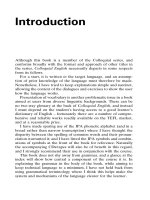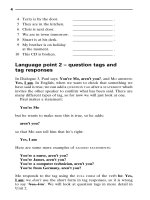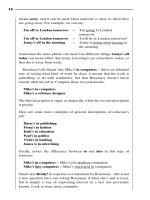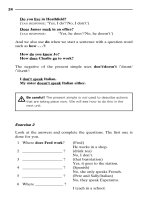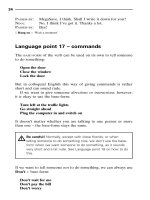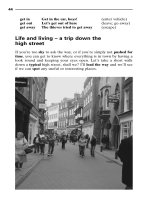Tài liệu A complete English language course part 17 docx
Bạn đang xem bản rút gọn của tài liệu. Xem và tải ngay bản đầy đủ của tài liệu tại đây (86.81 KB, 10 trang )
3 Did she open the window? [+] _______________________
4 Terry didn’t wash the car. [+] _______________________
5 Henry walked to college
today. [?] _______________________
6 Suzie cleaned her teeth. [–] _______________________
7 The others arrived late. [?] _______________________
8 Sandra played the piano. [?] _______________________
Language point 55 – more about the
past simple
In Dialogue 3 both
PAST SIMPLE
and
PRESENT PERFECT
tenses are used
– it’s important in English to use them correctly and to understand
the differences; they are both past tenses, but they are not inter-
changeable!
The bank employee says:
One of our customers has
just handed a passport in
He uses the
PRESENT PERFECT
because it happened a very short time
ago – a few minutes, perhaps. But then he asks:
When exactly did you lose
your passport?
He uses the
PAST SIMPLE
here because he’s talking about an event
that happened further back in the past – earlier that day.
Let’s look at these two sentences using go:
a Anne’s gone
to the bank (present perfect)
b Anne went
to the bank yesterday (past simple)
Sentence (a) means that Anne was here a short while ago, but she
isn’t here now. Sentence (b) simply states what happened yesterday.
Another way of looking at this difference is to imagine that we
are in a room where Anne works. If someone comes in and asks for
Anne, then we can only say (a) if Anne isn’t in the room (because
she’s gone); but we could say (b) even if Anne is in the room with
us, because the past simple describes a completed action in the past
with no reference to the present.
144
It is sometimes difficult for students of English to decide whether
to use the present perfect or the past simple when talking about the
past – but here are two helpful rules:
1 if something has happened a very short time ago:
PRESENT
PERFECT
2 if there is a word that indicates when something happened:
PAST
SIMPLE
So:
Is Kath here?
– She’s gone out to get a coffee – she’ll be back in a minute (1)
– She went out half an hour ago
– I don’t know where she is (2)
Back in Dialogue 2, Liz makes a statement and says:
You did take
all your stuff out of your bag
She could have said:
You took
all your stuff out of your bag
This would be the normal past simple statement – but here she uses
the auxiliary did (which we usually find only in past simple ques-
tions and negatives) to emphasise the action. And then Shamira uses
did as a tag response:
Oh yes – so I did!
Then she does the same thing again. Liz says:
Maybe the passport fell out then?
and Shamira replies:
Maybe it did
We also use did to make
QUESTION TAGS
in the past simple:
We went to Italy last year. – Did you?
Stuart hurt his knee at football today. – Oh dear, did he?
1111
2
3
4
5
6
7
8
9
10
11
1211
13
14
15
16
17
18
19
20
21
22
23
24
25
26
27
28
29
30
31
32
33
34
35
36
37
38
39
40
41
4211
145
Look at the difference between past simple and present perfect tags:
Helen has gone. – Has she?
Helen went yesterday. – Did she?
You haven’t seen Brenda, have you? – No, I haven’t.
You didn’t see Brenda yesterday, did you? – No, I didn’t.
Candace hasn’t come back yet, has she? – No, she hasn’t.
Candace didn’t come back yesterday,
did she? – No, she didn’t.
Finally, notice another use of do as an
AUXILIARY
– the policeman
in Dialogue 2 says:
Do feel free to use my phone
He puts Do before the
COMMAND FORM
(which is the same as the
BASE
-
FORM
– Language point 17) to change it from a command to a
friendly invitation. Here are some more examples:
Do sit down!
Do have a cup of tea!
Do remember to write!
Exercise 5
Decide whether to use the past simple or present perfect from the
brackets.
1 Come and look, everyone – Henry (fell/’s fallen) in the
water!
2 The manager (went/’s gone) out an hour ago.
3 (Did you see/Have you seen) that new film yet?
4 It’s getting late – (did you finish/have you finished) your
drink?
5 Dave (phoned/’s phoned) yesterday.
6 (Did you see/Have you seen) that French film on TV last
week?
7 I (invited/’ve invited) Fiona round – she’ll be here in a few
minutes.
8 Where (did my passport go/’s my passport gone)? It was here
just now!
146
9 It’s very quiet next door – (did they turn/have they turned) the
TV off at last?
10 (Have you spoken/Did you speak) French on your holiday to
France?
Language point 56 – past simple: ‘be’
and ‘have’
The verb have is easy in the past simple: had /hd/; and questions
and answers are done in the usual way:
+ I had
an apple
? Did
I have an apple?
– I didn’t have
an apple
But be is unusual – first of all, it has two past simple forms: was
/wɔz/ and were /w
r
/:
I was
you were
he/she was
we were
they were
But it’s also unusual in how we form past simple questions and
negatives:
+ Leasa was in the shop
? Was Leasa in the shop?
not ‘Did Leasa be in the shop?
’
– Leasa wasn’t in the shop
not ‘Leasa didn’t be in the shop
’
We don’t use the auxiliary did with the past simple of be.
You will notice, as you get more familiar with colloquial English,
that be and have are much more frequently used in the past simple
than in the present perfect. The same is true for some other
common verbs, for example said /sεd/ (past simple of say) and
thought /θɔt/ (past simple of think).
1111
2
3
4
5
6
7
8
9
10
11
1211
13
14
15
16
17
18
19
20
21
22
23
24
25
26
27
28
29
30
31
32
33
34
35
36
37
38
39
40
41
4211
147
Exercise 6
Turn these sentences into statement, question or negative as indi-
cated.
1 Fred wasn’t at home. [?] Was Fred at home?
2 I didn’t have breakfast today. [+] _________________
3 You were late for the meeting. [?] _________________
4 Was James ready? [–] _________________
5 Did they have any money? [–] _________________
6 The children weren’t happy. [+] _________________
7 Was Fiona in town today? [+] _________________
8 My brother had the money. [–] _________________
Dialogue 4
Jenny has some news to tell Candace.
J
ENNY
: Guess who I saw in town today!
C
ANDACE
: Who?
J
ENNY
: Johnny Depp!
C
ANDACE
: You’re joking!
J
ENNY
: No, I really did see him. I was walking down the High
Street and all of a sudden I saw Johnny!
C
ANDACE
: What was he doing?
J
ENNY
: He was sitting in a café reading a newspaper. I saw
him through the window.
C
ANDACE
: So what did you do?
J
ENNY
: What do you think I did? I knew it was him, so I
walked straight in and asked him for his autograph.
C
ANDACE
: And did he give you it?
J
ENNY
: Yes, and while he was signing my T-shirt I invited him
round for coffee this afternoon.
C
ANDACE
: What? Johnny Depp is coming round for coffee?
J
ENNY
: Of course not, silly. He’s far too busy filming.
C
ANDACE
: What a relief – I don’t have to tidy the house.
J
ENNY
: Oh yes you do – Brad Pitt was with him in the café,
and he’s finished filming for the day.
C
ANDACE
: What!!?
J
ENNY
: Better get tidying, Candace. We’re expecting him at
eleven.
148

